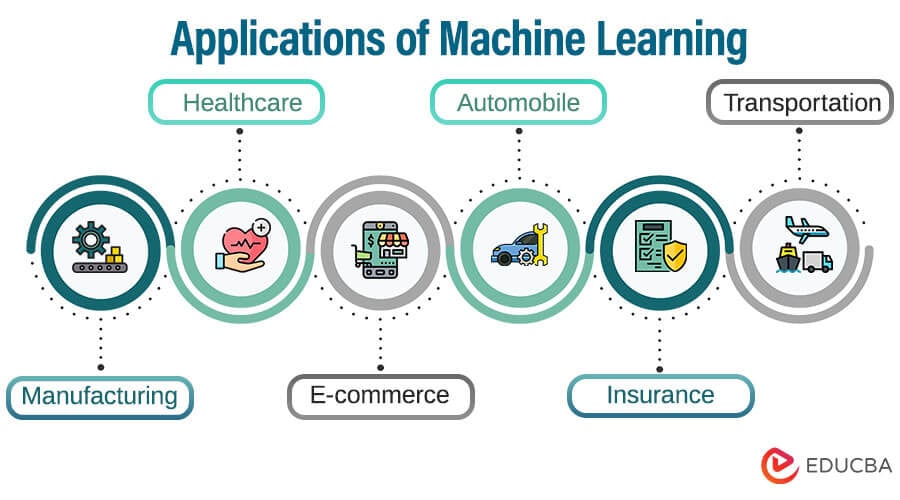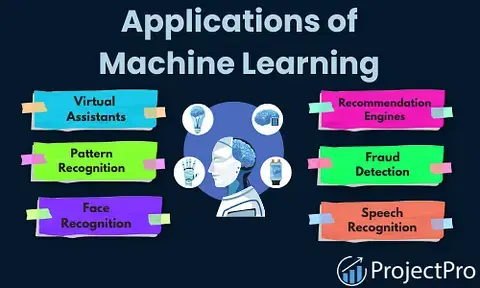Reference




OpenAI's Answer
Machine learning algorithms have numerous applications across various domains, revolutionizing how we process data and make predictions. Here are some notable applications:
-
Image Recognition: Machine learning is widely used in image recognition to identify objects, people, text, and more in digital images. This application is prevalent in social media platforms for tagging people or in applications for facial recognition (Source).
-
Speech Recognition: Algorithms can convert spoken language into text, empowering virtual assistants like Siri and Google Assistant and enhancing accessibility for individuals with hearing impairments (Source).
-
Recommendation Systems: Online services like Netflix, Amazon, and Spotify use machine learning to recommend movies, products, and music based on user preferences and behavior patterns (Source).
-
Healthcare and Diagnostics: Machine learning models help in medical diagnostics by analyzing medical images or predicting disease outbreaks based on data patterns, leading to early detection and effective treatment plans (Source).
-
Autonomous Vehicles: Self-driving cars use machine learning to recognize traffic signs, pedestrians, and other vehicles, enhancing navigation and safety (Source).
-
Fraud Detection: In banking and finance, algorithms analyze transaction patterns to detect fraudulent behavior, protecting organizations and customers from criminal activity (Source).
-
Predictive Analytics: Businesses use machine learning to forecast sales, stock trends, and customer behavior, aiding in strategic planning and resource management (Source).
Here is a visual representation of some machine learning applications:

Machine learning is a transformative technology that continues to evolve, enabling advancements across these and many other fields.
Follow Up
Reference




Moonshot's Answer
Machine learning algorithms have a wide range of applications across various industries. Here are some of the key applications:
-
Image Recognition: Used to identify objects, persons, places, and more in digital images, which is common in applications like facial recognition and medical image analysis. Javatpoint
-
Speech Recognition: Converts spoken language into text, which is utilized in virtual assistants like Siri and Alexa. DataCamp
-
Product Recommendations: Online platforms like Amazon and Netflix use machine learning to suggest products or content based on user behavior and preferences. Simplilearn
-
Sentiment Analysis: Analyzes social media and customer reviews to understand public opinion about a brand or product. Simplilearn
-
Automating Employee Access Control: Machine learning can be used to enhance security systems by recognizing individuals and determining access permissions. Simplilearn
-
Self-Driving Cars: Autonomous vehicles use machine learning to perceive the environment and make driving decisions. DataCamp
-
Catching Email Spam: Machine learning algorithms help in filtering out spam emails by identifying patterns associated with unsolicited messages. Emeritus
-
Predict Traffic Patterns: Machine learning can predict traffic congestion and suggest optimal routes, improving transportation efficiency. Emeritus
-
E-commerce Product Recommendations: Machine learning algorithms analyze user behavior to suggest products that a customer may be interested in purchasing. Emeritus
-
Fraud Detection: Banks and financial institutions use machine learning to detect fraudulent transactions by identifying unusual patterns. GeeksforGeeks
These applications demonstrate the versatility and impact of machine learning in modern technology and business practices. Images related to these applications can be found in various sources, such as Javatpoint and Educba.
Follow Up
Related
explain about the applications of machine learning algorithms
Machine learning in social media analytics in user engagements write research paper
What are some notable video games that involve algorithmic problem-solving?
How do pattern recognition algorithms help in solving geophysical problems?